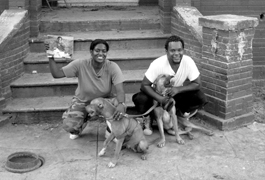home | metro santa cruz index | movies | current reviews | film review

Photograph by Zeitgeist Films
SURVIVALISTS: Kimberly Rivers Roberts and husband Scott try to stay high and dry during Katrina.
Raging Waters
'Trouble the Water' documents close up the efforts of the Ninth Ward to survive Hurricane Katrina.
By Richard von Busack
There is a rich strand of imagery about water in spirituals and blues. White kids like me who thrilled to Led Zeppelin's cover of "When the Levee Breaks" didn't realize that Kansas Joe McCoy and Memphis Minnie's original song was based on the catastrophic flooding of the Mississippi in 1927. Those horrors were repeated when Hurricane Katrina arrived in 2005. Even the title of the new documentary Trouble the Water comes from "Wade in the Water," an old spiritual first recorded 107 years ago.
Professional filmmakers Tia Lessin and Carl Deal (Fahrenheit 9/11) had intended to make a documentary about Katrina when they had a chance encounter with a refugee in an Alexandria, La., Red Cross shelter. Twenty-four-year-old Kimberly Rivers Roberts and her husband, Scott, fled the city with home-movie footage they had taken of the waters rising. Trouble the Water alternates eyewitness views of the flood with the producers' new footage and quick, well-chosen news images of the disaster. Most shattering are end-of-the-world phone calls to 911 from citizens stuck in their attics waiting to drown.
A few weeks after the flood, the Robertses and the filmmakers revisit the places where they sought shelter. One stop is a soon-to-be-closed naval base full of empty barracks, where the couple had been turned away with M-16s. The Roberts also stop to talk to the mostly white Oregon National Guardsmen who had been on duty after the streets emptied. (The Louisiana National Guard were busy elsewhere, in Iraq.) The soldiers and the survivors try gently to bridge a terrific cultural gap. One guardsman mutters, "Civilian people have no concept of what it takes to survive." The Robertses had casually taken pre-flood footage of the Ninth Ward while riding on their bicycles. Kimberly greets old ladies on the porch and goes to pick up some meat bones at the corner store. In the United States, there's rich and there's poor--and then there's urban Louisianans. These are people who were left to their own devices long before the big storm hit.
While Mayor Ray Nagin declared the evacuation of the city, no provisions were made for people without cars. Public transportation was halted; and the poor, the old and the mostly black citizens were left to tough it out. To the camera, Kim Roberts says she can't afford what she describes as "the luxury" of leaving. Kim films some of her neighbors huddling in her attic during the storm, some brought to safety by a local man using a cylindrical punching bag as a float. About the only treasure she saves from her house is a waterlogged photo of her mother, a HIV-positive crack addict who died when Kimberly was 13.
Trouble the Water's group filmmakers contrast the disaster with the fumbling aftermath. FEMA kept--and keeps, to this day--survivors waiting. The documentary turns the sharpest focus on how little has been done since, and how foolish some of it has been: New Orleans' attempt to snazz up its image with a jazzy tourist video. We revisit Michael D. "Heckuva job, Brownie" Brown, who is still at large. We also get a little touch of W, high and dry at a senior citizens trailer park in Arizona. As usual, it's difficult to read his inscrutable expression, but Bush seems not to notice his newest distinction: becoming the first U.S. president to lose a city since the Civil War.
Rivers Roberts is a gifted, bigger-than-life performer; she had been recording under the name Black Kold Madina before the flood. She almost lost all her recordings in the disaster. The film stops for her performance of an autobiographical rap song, "Amazing," which exemplifies the best of this forceful street poetry; point by point, Kim preserves the outline of the kind of life that too often gets knocked aside or blown away.
She was also at the nexus of loss: When the waters cleared, they revealed her uncle killed and her grandmother among those left behind in the hospital to perish. Kim's little brother, "Wink," almost joined the dead, too. He was in the city jail on a misdemeanor charge after the jailers fled and left the prisoners to fend for themselves.
Trouble the Water celebrates the resistance and resilience of the Ninth Ward. "In its ruin, it was believable, but only in the way certain dreams are believable ... post-World War III dreams," writes John Rosenthal in the literary magazine The Sun. Next up is what Rosenthal calls "an indifference now transforming itself into a mercilessly strategic land grab": a vulturish gentrification masked as redevelopment. In this not-to-be missed documentary, the Robertses reverse that fatalistic proverb everyone in the ghetto repeats whenever someone turns up dead. They were at the right place at the right time. They prove their neighborhood was no vacuum just waiting for nature to fill it.
![]() TROUBLE THE WATER (Unrated; 90 min.), a documentary by Carl Deal, Tia Lessin and Kimberly and Scott Rivers Roberts, opens Friday at the Nickelodeon. A Q-and-A with executive producer Danny Glover follows Friday's 7pm showing.
TROUBLE THE WATER (Unrated; 90 min.), a documentary by Carl Deal, Tia Lessin and Kimberly and Scott Rivers Roberts, opens Friday at the Nickelodeon. A Q-and-A with executive producer Danny Glover follows Friday's 7pm showing.
Send a letter to the editor about this story.
|
|
|
|
|
|